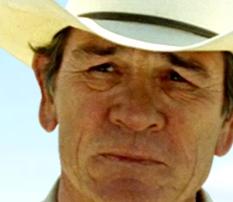|
The
country of title is no country for any man — old, young
or betwixt — that is unless you’re an amoral killer
riding shotgun with death or an extremely resourceful and
lucky son of a gun. That’s how Cormac McCarthy’s
laconic, yet eerily poetic 2003  novel
depicts the Texas outback in the early 1980’s:
overrun by thugs, hit men and corporate drug dealers, none
of which hold any regard for the law. And the few pure souls
who get tossed in the mix don’t fare as well as they
would in some other, more typical, Hollywood production—and
that’s just one of the refreshing charms to No Country
for Old Men. novel
depicts the Texas outback in the early 1980’s:
overrun by thugs, hit men and corporate drug dealers, none
of which hold any regard for the law. And the few pure souls
who get tossed in the mix don’t fare as well as they
would in some other, more typical, Hollywood production—and
that’s just one of the refreshing charms to No Country
for Old Men.
The
faithful adaptation is a return to Blood Simple territory
for the Coen brothers, who, whether they know it or not, have
a genuine knack for the dark, nasty and depraved
(if you disagree, beyond Blood Simple, sample Miller’s
Crossing, Barton Fink or even Fargo).
The catalyst for the border crossing mayhem that unfolds in
somber, violent waves is fairly simple; on a hunting sojourn
to an isolated ravine, semi-employed Vietnam vet, Llewelyn
Moss (Josh Brolin channeling a young Nick Nolte) stumbles
upon the aftermath of a drug deal gone sour. There’s
no last man standing, just bullet riddled bodies, a flatbed
full of heroin and a satchel snug tight with two million dollars.
Llewelyn leaves the smack but takes the cash.
Back
in 1980, two million dollars would be equivalent ten or twenty
million today so you can imagine the kind of attention Llewelyn
draws. The drug exec., calling the shots from a glass encased
office tower, hedges his bets by hiring several outfits to
go after the green, with some of them even cannibalizing each
other during the languorous game of cat and mouse. Hot on
Llewelyn’s trail are a gaggle of faceless, Uzi wielding
Mexicans, a PI (Woody Harrelson) with a reputation for cleaning
up unseemly messes and a freakish incarnation known as Anton
Chigurh (Javier Bardem). Chagrin possesses no limits or fear,
and almost to the point of god-like omnipotence, he’s
in control of every situation, regarding life or death tensions
or a blaze of bullets with all the heavy weariness of having
to file taxes. As such, you’d think Chigurh would be
an imposing specter, but not so, he’s cursed with a
foppish Prince Valliant coif that never loses its form, even
when strangling a deputy during a physical and protracted
take down; and then there’s his bizarre artillery, the
oxygen tank that doubles as an air gun and the mother of all
silencers that caps an enormous rifle. He’s cartoonish,
yet lethal, and by the middle of the film you realize there’s
something profoundly biblical about Chigurh. The purpose and
conviction with which stalks the bleak landscape is akin to
that of Death’s in Ingmar Bergman’s The Seventh
Seal; though, by the end of the film, Chigurh’s
actions seem more the deeds of the Devil than an avenging
angel or loyal foot soldier.
In
such a universe, one might think Llewelyn out matched, and
he is; but as the stakes rise, he proves more than capable
at staying alive and sheltering his wife (Kelly Macdonald)
from harm’s way. His resolve and resilience inspire
even if his hubris sits on his shoulder like a ticking bomb.
His one potential saving grace comes in the form of Tommy
Lee Jones' Sheriff Bell. He’s a dinosaur, and a tired
one at that, but he’s world-wise and sharp enough to
know that Llewelyn’s stepped into a hornet’s nest
of evil.
Not
all the various threads wind up in the same place at the same
time. The conclusion, just as in the book, is a quick flurry
that initially feels unsatisfying, but as you walk out of
the dark magic land of the theater and return to your safe
world, the profound effect of the film begins to take hold.
No Country for Old Men doesn’t offer heroes;
instead it bears its gray soul. It’s a modern western
more concerned with philosophy and destiny than balancing
the scales of good and evil.
--
T. B. Meek
 |



